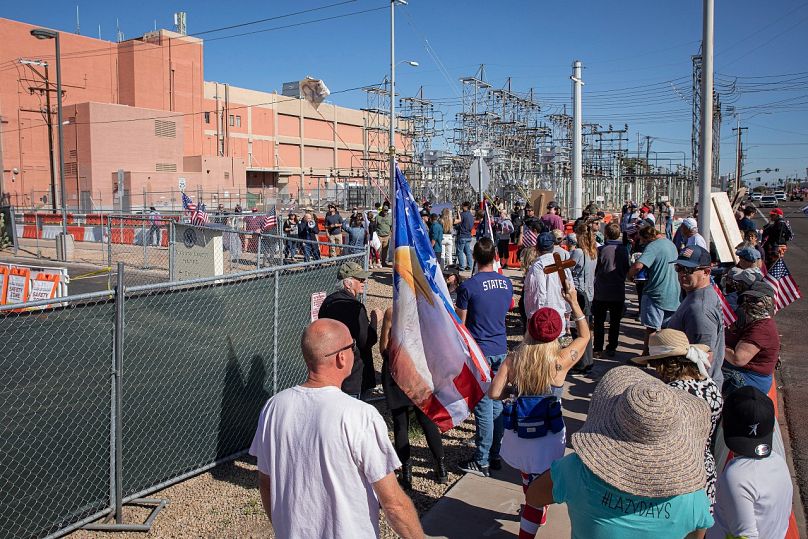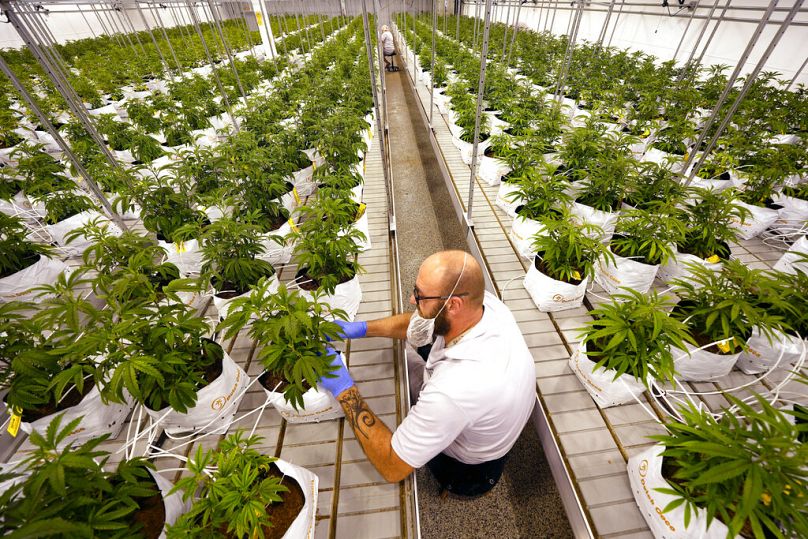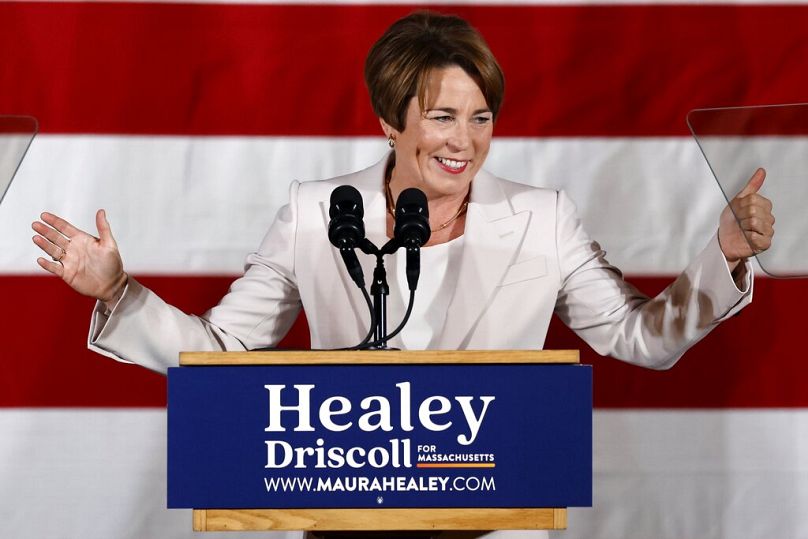With the Democrats having performed better than expected, here is what we know about the US midterm elections as ballot counting continues.
1. Democrats retain control of Senate as Republican 'red wave' fails to materialise
The overall picture is a breathtakingly close battle between Democrats and Republicans for control of Congress and the future of Joe Biden's agenda. A week after the vote on November 8, the counting of ballots is continuing in some states.
 ADVERTISEMENT
ADVERTISEMENT
 ADVERTISEMENT
ADVERTISEMENT
The US Senate will remain in Democrats' hands after they retained seats in Arizona and Nevada, in a major victory for the president. Georgia will have a runoff on 6 December.
However, Republicans remained close to winning control of the US House of Representatives. Projections on Monday still gave the Republicans 211 seats, seven short of the 218 needed to wrestle control from the Democrats, who were on 206. Several closely competitive races remain undeclared.
Traditionally, the sitting president and the party in power suffer a bloody nose in midterm elections. There've been mixed results for both parties, but Democrats have avoided the sweeping defeat that Republicans had hoped for.
Instead, an anticipated "red wave" -- one prominent Republican had predicted a "tsunami" -- petered out into more of a "red ripple".
Republican efforts to ban abortion and cast doubt on the nation's vote-counting process seem to have gone down badly.
Biden said voters had expressed frustrated with record inflation, crime and other issues -- adding that he was "ready to compromise with Republicans".
Even a slim House majority would allow Republicans to block Joe Biden's legislative agenda and shape the rest of his presidential term.
But failure to win control of the Senate means the Republicans are denied the power to block Biden's nominees for judicial and administrative posts.
2. Trump wounded as MAGA candidates fall short
Donald Trump had thrown his political weight, and the weight of his MAGA ("Make America Great Again") supporters, behind a number of candidates, many of them on the far-right when it comes to conspiracy theories about stolen elections, rigged votes, and denying that Joe Biden legally won the 2020 US presidential ballot.
The former president endorsed more than 300 candidates in the midterm cycle and was hoping to use Republican victories as a springboard for a 2024 presidential campaign.
There were notable wins in Ohio for "Hillbilly Elegy" author JD Vance, and Trump's former White House spokesperson Sarah Huckabee Sanders who becomes the first female governor in Arkansas.
But several prominent figures failed to get elected.
Perhaps the most high-profile is the defeat of Kari Lake in Arizona, who lost to Democrat Katie Hobbs in the race for governor of the southwestern state, according to US media.
The firebrand former TV news anchor -- who was touted by Britain's Nigel Farage as a possible 2024 vice presidential running mate for Trump -- consistently repeated baseless claims of electoral fraud at the 2020 vote during the campaign, whereas her opponent staunchly defended the election's integrity.
In Pennsylvania, TV Doctor Mehmet Oz, who only narrowly won his Senate primary with Trump's backing, lost to Democrat John Fetterman. Doug Mastriano, the Trump-backed nominee for governor in the eastern state, also lost.
Mastriano was seen outside the US Capitol on the day of the insurrection on January 6, 2021, he arranged for buses to transport people to Trump’s rally in Washington that day, and regularly communicated with the defeated president as he tried to subvert the result.
In New Hampshire, voters reelected Republican Governor Chris Sununu to a fourth term but rejected three congressional candidates who were either endorsed by Trump or aligned themselves with the former president, reelecting sitting Democrats instead.
Hardline Colorado conservative Lauren Boebert was one of the best-known of Trump's protégés nationally: she had millions of dollars of support going into the midterm elections, and a nine-point lead in the polls for a district that had been redrawn to favour right-leaning voters.
But late on Thursday her race for reelection to the House of Representatives was still too close to call.
How controversial is she? Boebert suggested two female Muslim politicians were terrorists and part of a "jihad squad;" she spoke out against gun control; she likened the Russian invasion of Ukraine to Canada, saying "we also have neighbours to the north who need freedom and you need to be liberated;" and said that it should be illegal for gay people to come out before age 21, among other positions.
In Georgia, Trump-backed Herschel Walker is neck-and-neck with his Democratic rival ahead of the December runoff.
In Florida, Ron DeSantis -- a potential Republican presidential challenger in 2024 who Trump has wasted no time attacking -- won re-election as governor by a handsome margin.
Some Trump allies have called on him to delay a planned "big announcement" on November 15. He has been widely expected to confirm he is running for president again in 2024.
3. Mixed bag for 'election deniers' seeking state voting oversight posts
Tens of millions of Americans weren't just voting for members of the House of Representatives, Senate or for Governors, there were also ballots in many states for lower-level jobs, like secretaries of state, or local school boards.
These so-called "down-ballot" votes are where some of America's political ideology battles are being fought: if you think of school boards being controlled by far-right Republicans who have a say on what gets taught in schools, like race, history, evolution and science, sex education and even which books children are allowed to read in class.
Most secretaries of state have the crucial role of overseeing elections. Half of the 22 Republicans seeking those key roles have repeated Trump’s election lies. Seven endorsed his attempts to overturn the presidential vote and remain in power.
In Minnesota, Republican Kim Crockett, who echoed some of Trump’s lies about voting, lost her bid for secretary of state.
In Michigan, the Democratic secretary of state declared victory over Kristina Karamo, one of the most prominent election conspiracists in the country.
In New Mexico, Republican Audrey Trujillo, who cheered on Trump’s effort to reverse the voters’ will in 2020, also lost to the Democratic secretary of state.
But in Alabama, voters gave the position to state Republican Wes Allen, who backed a groundless lawsuit to overturn Biden’s victory that was dismissed by the US Supreme Court.
In Indiana, Diego Morales, who ousted the Republican incumbent in the party primary by repeating Trump’s election lies, won the race for secretary of state.
Wyoming Republican Chuck Gray, a state lawmaker who also endorsed efforts to overturn the 2020 election, was running unopposed for the secretary of state post.
In Arizona -- where counting continues -- the Republican candidate for secretary of state Mark Finchem, who attended Trump’s January 6 rally, said he would not have certified Biden's 2020 victory in the state.
Jim Marchant, the Republican nominee in Nevada -- which has also yet to declare -- made the same promise.
So if Trump was to run for the White House again in 2024, and there were any disputes about voting integrity, some investigations would potentially be overseen by overt Trump allies who buy into his MAGA political ideology.
4. Post-election misinformation raises a predictable ugly head
A video on Fox News showed a Wisconsin poll worker initialling ballots before they were given to voters: normal procedure on election day.
But on Tuesday someone posted the clip to social media and claimed instead that it showed a Philadelphia election worker doctoring ballots.
By Wednesday the bogus claim was being shared by QAnon believers and far-right figures like Michael Flynn, ex-president Donald Trump's former national security adviser.
Baseless rumours and conspiracy theories reverberated around the internet as candidates and far-right influencers sought to explain away losses and closer-than-expected races.
Maricopa County in Arizona remained the epicentre of election misinformation after technical problems with voter tabulation machines spawned conspiracy theories about vote rigging. The claims spread despite explanations from local officials, including some from both parties, and assurances that all votes would be counted.
On election day, online mentions of Pennsylvania and election fraud topped the online conversation early on, according to an analysis by Zignal Labs, a media intelligence firm that tracks online content.
Many of the claims in that state since the election have focused on misleading explanations for the time it takes to count votes. In key battleground states like Pennsylvania, Michigan and Arizona, election officials cannot begin counting mail ballots until election day, guaranteeing delays.
In some cases on Tuesday, conspiracy theories about election fraud prompted violent threats, particularly on fringe platforms and websites popular with far-right groups. But in general, election day came and went with few major problems reported.
Misinformation about elections has been blamed for deepening political divides and increasing threats of political violence -- and also influenced the deadly attack on the US Capitol in January 2021.
5. Voters decided on marijuana legalisation
Initiatives to legalise marijuana were on the ballot in five states and passed in two of them, in a move signalling support gradually growing for legalisation even in conservative parts of the country.
Voters in Maryland approved a measure to legalise recreational marijuana for anyone age 21 and over, and allow possession of small amounts of the drug, or two plants. Anyone convicted of marijuana possession under old laws will soon be able to apply to have their record wiped.
It's a similar move in Missouri, but individuals over 21 will be allowed to possess up to three grams for personal use, as well as being able to petition to be released from jail or have their records wiped for non-violent marijuana-related convictions.
Voters in Arkansas, North Dakota and South Dakota rejected marijuana initiatives on the ballots in those states.
The state voting follows moves by President Joe Biden toward decriminalizing marijuana. Last month Biden announced he was pardoning thousands of Americans convicted of simple possession of marijuana under federal law.
The five states that held votes on Tuesday have legal medical marijuana programs. That includes Arkansas, which in 2016 became the first Bible Belt state to approve medical marijuana.
The state's dispensaries opened in 2019, and more than 91,000 patients have cards to buy marijuana legally for medical conditions.
6. Abortion rights enshrined in state laws
Five months after the US Supreme Court reversed reproductive rights for women, a measure to enshrine abortion rights in state laws was on the ballots in a number of states, prompted by Democrats.
Voters in California, Michigan and Vermont voted to protect abortion rights at the state level -- despite opposition from some right-wing and religious groups.
The divisive issue was a factor for many voters when it came to casting their ballots in Tuesday's election, with an Associated Press survey revealing that seven in 10 voters said the Supreme Court ruling on abortion was an important factor in their midterm decisions.
The survey also showed the reversal of reproductive rights for women was broadly unpopular. About six in 10 said they are angry or dissatisfied by it, while about four in 10 were pleased. And roughly six in 10 say they favour a law guaranteeing access to legal abortion nationwide.
Initiatives in Kentucky and Montana about enshrining abortion rights in the laws of those states were still too early to call.
7. Some election night 'firsts'
Even while vote counting continues -- likely for several more days with postal ballots -- there were some important political "firsts" to report already.
In Arkansas, the Mayor of Little Rock -- the first popularly elected black mayor -- was voted back into office; while Maryland will get its first black governor in Democrat Wes Moore (he becomes only the third elected black governor in US history).
Meanwhile, in the northeast state of Massachusetts, Democrat Maura Healey will become the first female governor in the "Bay State" -- and also America's first out-lesbian governor.
Arkansas, Alabama and New York will get their first elected female governors, while Vermont will send its first-ever Congresswoman to DC, as Democrat Becca Ballint's win means her state breaks its streak of being the only US state never to elect a woman to Congress.
In Oklahoma, Republican Marwayne Mullin because the first Native American from his state to go to the Senate in almost 100 years. He's a member of the Cherokee Nation.
And in Michigan, Democrat Shri Thanedar, who immigrated to the US from India, becomes the first Indian-American elected to Congress from his state.
8. Show me the money — these were expensive elections!
The 2022 elections are on track to cost $16.7 billion (€16.6 billion) at the state and federal level, making them the most expensive midterms ever, according to the nonpartisan OpenSecrets.
For perspective: The contests will nearly double the cost of the 2010 midterm elections, more than double the 2014 midterms and are on pace to roughly equal the 2022 gross domestic product of Mongolia.
At least $1.1 billion (€1 billion) given at the federal level so far this election season has come from a small coterie of donors, many of whom have favoured conservative causes.
“When you look at the top 25 individual donors, conservative donors heavily outweigh liberal donors by $200 million (€199 million),” said Brendan Glavin, a senior data analyst for OpenSecrets. “There’s a big skew.”
Tech billionaire Peter Thiel ($32.6 million), shipping goods magnate Richard Uihlein ($80.7 million), hedge fund manager Ken Griffin ($68.5 million) and Timothy Mellon, an heir to a Gilded Age Fortune who gave $40 million, are among the top conservative donors.
On the liberal side, hedge fund founder George Soros gave the most ($128 million), though much of it has yet to be spent. Sam Bankman Fried, a liberal 30-year-old cryptocurrency billionaire, gave $39.8 million.















